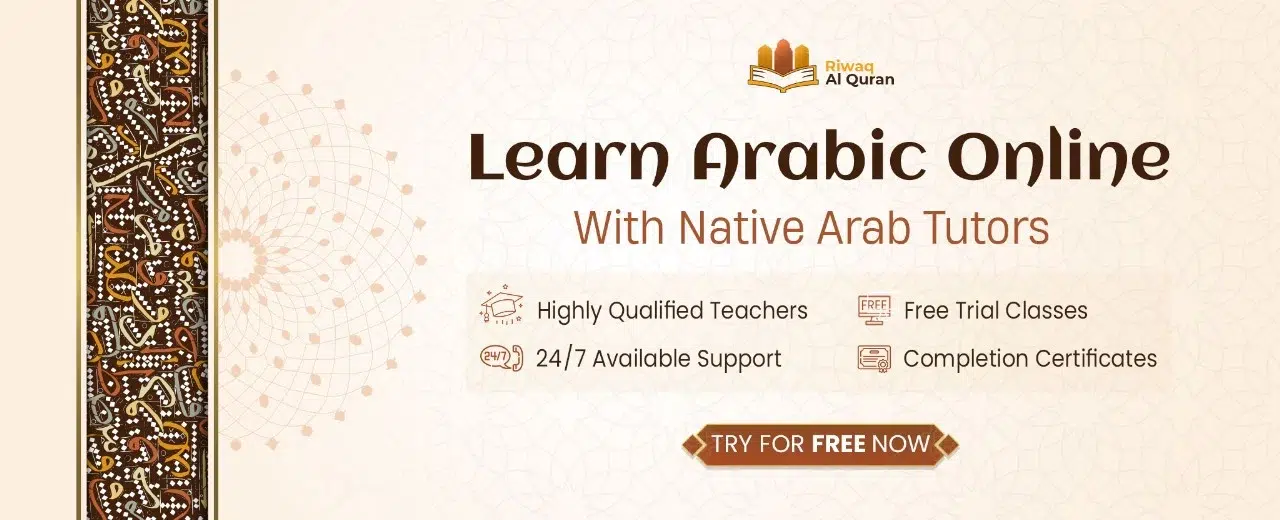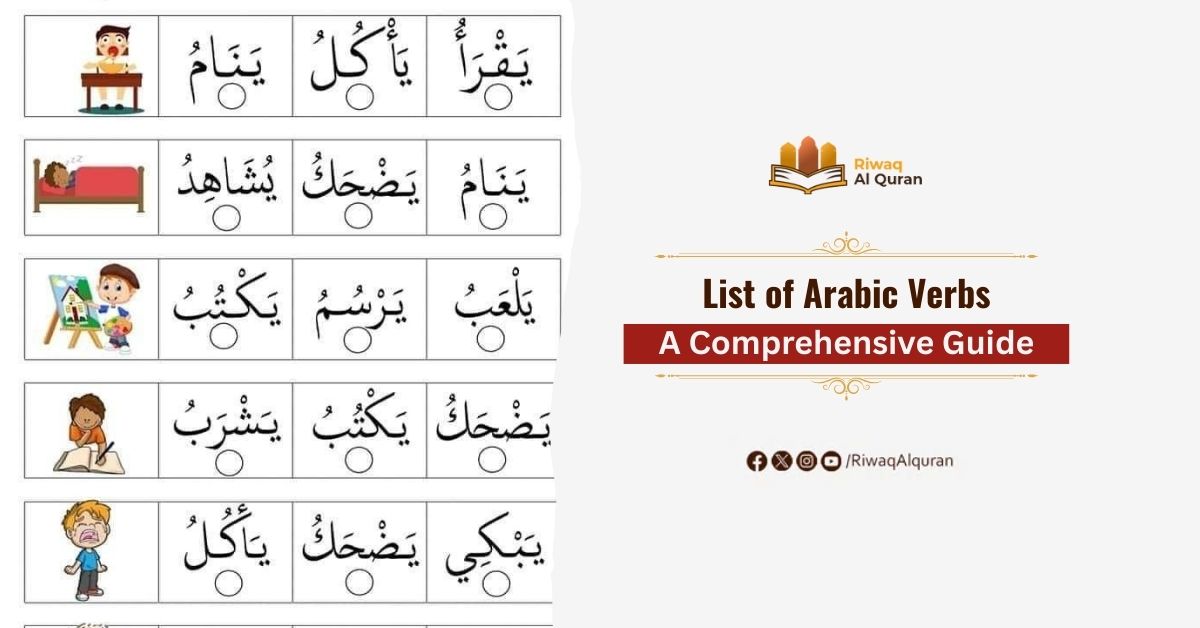Learning Arabic can seem challenging, especially when it comes to verbs, which form the backbone of the language. Verbs not only indicate actions but also convey time, mood, and subject, making them essential for constructing meaningful sentences. A solid understanding of Arabic verbs allows learners to communicate effectively, read with comprehension, and write accurately.
To make this process easier, having a structured list of Arabic verbs is invaluable. From common daily verbs to advanced expressions, knowing them provides a foundation for fluency. By practicing regularly, understanding verb patterns, and applying them in real-life contexts, learners can gradually master the language and gain confidence in using Arabic in everyday conversations.
Table of Contents
Arabic Verbs
Arabic verbs (الأفعال) are words that express actions, states, or occurrences. They are the core of Arabic sentences, showing what is happening.
Most Arabic verbs are derived from a three-letter root that conveys the core meaning. One root can generate multiple verbs by applying different patterns or forms.
Verbs change according to tense (past, present, future) and the person acting (I, you, he, she, we, they).
Examples of Usage
For the root ك-ت-ب:
- كَتَبَ (kataba) → “he wrote”
- يَكْتُبُ (yaktubu) → “he writes”
- اُكْتُبْ (uktub) → “write!”
Understanding Arabic verbs is essential for forming sentences, expressing ideas clearly, and building fluency in reading, writing, and speaking.
List of Arabic verbs
Arabic verbs are the building blocks of everyday communication. Learning the most common verbs will help you understand sentences, express yourself clearly, and interact with native speakers. Here is a list of essential Arabic verbs with their meanings and examples:
1. Regular Verbs (الأفعال الصحيحة) – Form I
Simple verbs that follow standard conjugation patterns.
| Meaning | Transliteration | Arabic |
| he wrote | kataba | كَتَبَ |
| he read | qara’a | قَرَأَ |
| he ate | akala | أَكَلَ |
| he drank | shariba | شَرِبَ |
| he went | dhahaba | ذَهَبَ |
| he sat | jalasa | جَلَسَ |
| he studied | darasa | دَرَسَ |
| he knew | ‘alima | عَلِمَ |
| he heard | sami‘a | سَمِعَ |
| he said | qāla | قَالَ |
| he did | fa‘ala | فَعَلَ |
| he slept | nāma | نَامَ |
| he returned | raja‘a | رَجَعَ |
| he found | wajada | وَجَدَ |
| he laughed | ḍaḥika | ضَحِكَ |
| he cried | bakā | بَكَى |
2. Weak Verbs (الأفعال)
Verbs containing a weak letter (و, ي, or ا) in their root.
a. Assimilated (الفعل المثال) – starts with a weak letter
| Meaning | Transliteration | Arabic |
| he arrived | waṣala | وَصَلَ |
| he wanted | arāda | أَرَادَ |
| he became | aṣbaḥa | أَصْبَحَ |
b. Hollow (الفعل الأجوف) – middle letter weak
| Meaning | Transliteration | Arabic |
| he said | qāla | قَالَ |
| it spread | shā‘a | شَاعَ |
C. Defective (الفعل الناقص) – ends with a weak letter
| Meaning | Transliteration | Arabic |
| he threw | ramā | رَمَى |
| he remained | baqiya | بَقِيَ |
3. Doubled Verbs (الأفعال المضعفة)
Verbs with two identical letters in a row (often simplified in the present tense).
| Meaning | Transliteration | Arabic |
| he tightened | shadda | شَدَّ |
| he taught | ‘allama | عَلَّمَ |
| He taught intensively | darrasa | دَرَّسَ |
4. Verbs by Derived Forms (الأوزان – Forms I–X)
Form II (فعّل) – Causative or Intensive
| Meaning | Transliteration | Arabic |
| he taught | darrasa | دَرّسَ |
| he opened intensively | fattaḥa | فَتَّحَ |
| he explained | sharraḥa | شَرَّحَ |
Form III (فاعل) – Partnership or Interaction
| Meaning | Transliteration | Arabic |
| he watched | shāhada | شاهَدَ |
| he spoke | takallama | تَكَلَّمَ |
Form IV (أفعل) – Causative
| Meaning | Transliteration | Arabic |
| he sent | arsala | أَرسَلَ |
| he informed | akhbara | أَخْبَرَ |
Form V (تفعّل) – Reflexive / Intensive
| Meaning | Transliteration | Arabic |
| he learned | ta‘allama | تَعَلّمَ |
| he advanced | taqaddama | تَقَدّمَ |
Form VI (تفاعل) – Reciprocal / Mutual Action
| Meaning | Transliteration | Arabic |
| they fought each other | taqātala | تَقاتَلَ |
| they shared | tashāraka | تَشَارَكَ |
Form VII (انفعل) – Passive / Reflexive
| Meaning | Transliteration | Arabic |
| it was broken | inkasara | اِنْكَسَرَ |
| it disappeared | inṭamasa | اِنْطَمَسَ |
Form VIII (افتعل) – Reflexive / Internal Action
| Meaning | Transliteration | Arabic |
| he participated | ishtaraka | اِشْتَرَكَ |
| he sought forgiveness | istaghfara | اِسْتَغْفَرَ |
Form IX (افعلّ) – Colors / Defects
| Meaning | Transliteration | Arabic |
| it turned red | iḥmarra | اِحْمَرَّ |
| it turned yellow | iṣfarra | اِصْفَرَّ |
Form X (استفعل) – Seeking / Requesting Action
| Meaning | Transliteration | Arabic |
| he inquired | istafahama | اِسْتَفْهَمَ |
| he used | asta‘mala | اِسْتَعْمَلَ |
This organization helps learners recognize patterns, memorize roots, and apply verbs in different contexts.


30 most commonly used Arabic verbs in daily life
| Meaning | Transliteration | Arabic |
| he was | kāna | كَانَ |
| he is | yakūnu | يَكُونُ |
| he did | fa‘ala | فَعَلَ |
| he said | qāla | قَالَ |
| he ate | akala | أَكَلَ |
| he drank | shariba | شَرِبَ |
| he went | dhahaba | ذَهَبَ |
| he sat | jalasa | جَلَسَ |
| he slept | nāma | نَامَ |
| he worked | ‘amila | عَمِلَ |
| he studied | darasa | دَرَسَ |
| he knew | ‘alima | عَلِمَ |
| he understood | fahima | فَهِمَ |
| he saw | ra’ā | رَأَى |
| he heard | sami‘a | سَمِعَ |
| he asked | sa’ala | سَأَلَ |
| he answered | ajāba | أَجَابَ |
| he returned | raja‘a | رَجَعَ |
| he arrived | waṣala | وَصَلَ |
| he started | bada’a | بَدَأَ |
| he finished | intahā | اِنْتَهَى |
| he played | la‘iba | لَعِبَ |
| he walked | mashā | مَشَى |
| he rode | rakiba | رَكِبَ |
| he requested / sought | ṭalaba | طَلَبَ |
| he gave | a‘ṭā | أَعْطَى |
| he took | akhatha | أَخَذَ |
| he explained | sharaḥa | شَرَحَ |
| he taught | ‘allama | عَلَّمَ |
| he found | wajada | وَجَدَ |
Know more about the Best Islamic Studies Online Course
Why Learning Arabic Verbs is Important
Verbs are essential in any language, and Arabic is no exception. They help you express actions, states, and events. Understanding Arabic verbs allows you to:
1. Forms the Foundation of Sentences
Arabic verbs are essential in constructing sentences. They indicate the action, the time, and who is performing it, helping your sentences make sense grammatically.
2. Improves Communication Skills
Knowing verbs allows you to express actions, narrate events, and have meaningful conversations with others in Arabic.
3. Expands Your Vocabulary
Learning verbs gives you more words to describe a variety of actions, situations, and emotions, making your language richer and more versatile.
4. Helps Understand Arabic Grammar
Arabic verbs follow specific patterns and tenses. Mastering them helps you understand conjugations, sentence structure, and overall language rules.
5. Enhances Reading and Writing
Many Arabic texts revolve around verbs. Knowing them enables you to read articles, stories, and documents more effectively and write sentences correctly.
6. Boosts Confidence in Speaking
The more verbs you know, the easier it becomes to speak Arabic confidently. Familiarity with verbs reduces hesitation and improves fluency.
7. Facilitates Learning Advanced Concepts
Once you master verbs, learning more complex grammar, idiomatic expressions, and nuanced sentence structures becomes much easier.
Read more about our Online Arabic Classes


Learn Arabic Verbs and Language Skills with Riwaq
Mastering Arabic verbs is essential for speaking, reading, and writing the language confidently. Learning goes beyond memorization—understanding usage, patterns, and context is key. Riwaq al-Quran offers structured courses that guide you through common and advanced Arabic verbs, complete with examples, exercises, and interactive lessons to strengthen both your vocabulary and practical language skills.
Through Riwaq, you can access video tutorials, detailed explanations, and practice activities, as well as discuss questions with instructors and fellow learners, ensuring a deep understanding and the ability to apply what you learn in real conversations.
Enroll today and experience how expert guidance can accelerate your journey in mastering Arabic.
We offer several courses such as:
- Online courses for kids.
- Online Quran classes for kids and adults.
- Online Arabic courses
- Online Ijazah courses
- Online Islamic Studies courses.
Here are a sample of our set of Quran Courses that will be helpful for you:
- Online Tafseer Course: Delve into Quranic meanings with our insightful online Tafseer course.
- Noorani Qaida Online: Learn Quranic basics efficiently through our Noorani Qaida online program.
- Online Quran Recitation Course: Enhance Quranic recitation skills through our expert-led online course.
- Online Tajweed Classes: Master Tajweed rules for beautiful Quranic recitation in online classes.
- Quran Memorization Online Course: Memorize the Quran effectively with our specialized online memorization course.
- Online Qirat Course: Explore diverse Qirat styles with our comprehensive online Qirat course.
- Online Quran Classes for Kids: Nurture a love for the Quran in kids through interactive online classes.
Conclusion
Mastering Arabic verbs is a key step toward achieving fluency in the language. By studying both basic and advanced verbs, practicing conjugations, and applying them in sentences, learners build a strong foundation that supports speaking, reading, and writing skills. A well-organized list of Arabic verbs can guide this learning journey effectively.
With consistent practice, engagement with native content, and use of interactive resources, anyone can enhance their command of Arabic verbs. Over time, this knowledge not only improves communication but also opens doors to deeper cultural understanding and appreciation of the Arabic language.


































